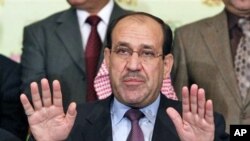The Iraqi parliament has voted to reinstate three top Sunni lawmakers from a list of politicians banned for ties with the Baath party of former leader Saddam Hussein. Iraqi officials are reporting that outgoing Prime Minister Nouri al-Maliki will formally present his new government on Monday.
Iraqi Prime Minister Nouri al-Maliki will formally present his new government to parliament Monday, according to Iraq's State Minister for Parliament Affairs Safa al-Din al-Safi. Mr. Maliki officially has until Dec. 25th to form the government.
The long-awaited event, barring any last minute glitches, would put an end to a nine month political vacuum following an inconclusive parliamentary election on March 7th.
At the same time, the Iraqi parliament voted to lift a ban on three top Sunni lawmakers, who had been forced to give up political activities by a committee to purge one-time Baath party members from the government.
One hundred and nine out of 170 members of parliament present at Saturday's session voted to lift the ban. The motion was read out in the chamber, before being approved. The motion states that (banned Sunni politicians) Saleh al-Mutlaq, Zafar al-Ani and Jamal Karbouli swear to the head of parliament's (Justice and Accountability Committee) that they condemn leaders of the former Baath party who committed atrocities against the Iraqi people and vow not to speak out in favor of the party, which seized power illegally in a coup.
Al Baghdadiya TV reported that Ali Faisal al Lami, who heads the committee which banned the three Sunni politicians, was disputing parliament's authority to reinstate them.
Meanwhile, former Iraqi Prime Minister Iyad Allawi, who reportedly demanded that the three lawmakers be reinstated before he would participate in a unity government, sounded upbeat.
He says that the government will be formed shortly, based on a principle of true partnership, and not just participation, such that all political entities have an equal and important role in making major political decisions, which is important for the future of the country. He adds that power will be shared equally among the parties.
Sounding less optimistic, politician Haidar al Abbadi told Al Arabiya TV that "key ministerial posts have now been divided up", but that the government may "ultimately prove unstable."
Iraq expert James Denselow, of Kings College in London, noted that the decision to reinstate the banned Sunni lawmakers may indicate that Prime Minister Maliki is attempting to be conciliatory, now that he has finally put together his government. "I think ultimately Maliki was far more sectarian when he was looking to shore up his own alliance in the sort of electoral college. But, now that he's secured the premiereship and it looks as if the cabinet positions have been carved out, he's far more likely to be reconciliatory to his opposition figures who would of course have to govern in this unity government for it to be effective," he said.
Denselow argues that the move is a "step in the right direction," even though he is not sure if a cross-section unity government will be effective.




